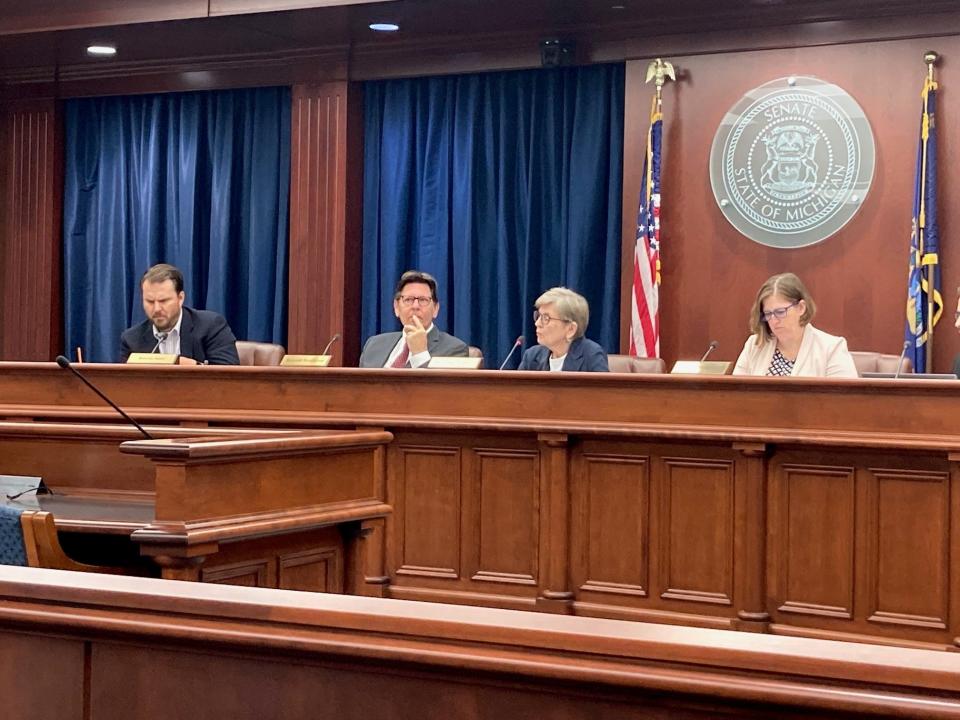Michigan elections panel rejects 7 recall petitions targeting lawmakers; approves just 1
LANSING — The Board of State Canvassers on Tuesday rejected proposed recall petitions against six Democratic and one Republican state lawmakers after citing numerous concerns about the petitions, including lack of clarity, lack of information about who is coordinating the efforts, and illegible handwriting.
Only one recall petition was approved, against state Rep. Cam Cavitt, R-Cheboygan. While the other recall petitions cited only each lawmaker's vote on a numbered bill, with no explanation of what the bill was about, the Cavitt petition cited his vote on the election of the House speaker. The board, made up of two Democrats and two Republicans, agreed unanimously that wording was sufficiently clear.

The six Democrats targeted for recall were: Reps. Noah Arbit, of West Bloomfield, Jaime Churches, of Wyandotte, Betsy Coffia, of Traverse City, Jennifer Conlin, of Ann Arbor, Sharon MacDonell, of Troy, and Reggie Miller, of Van Buren Township. The bills cited related to gun legislation and a proposed hate crime law.
Besides Cavitt, the Republican targeted for recall was Rep. Donni Steele, of Orion, for a vote on a sentencing bill related to gun legislation.
The seven rejected recall petitions were all on the basis of 2-2 votes on whether the wording of the petitions were sufficiently clear. The board often splits along partisan lines. This time, one Democratic and one Republican member — Jeannette Bradshaw and Tony Daunt respectively — said the wording was sufficiently clear, and one Democrat and one Republican — Chair Mary Ellen Gurewitz and Richard Houskamp respectively — said the wording was not sufficiently clear. Since three votes are needed to approve a petition, the tie votes resulted in rejection.
Bradshaw said her concerns related not to whether the reasons for the recalls were stated clearly enough, but whether the handwritten reasons were easy enough to read. She said she supported the Cavitt petition because its handwriting was more legible than the other ones.
Daunt said his main concern was the lack of a "disclaimer" showing who was coordinating and financially backing the petitions, which all were submitted at about the same time and had nearly identical wording except for the name of the lawmaker targeted, the bill number, and the date of the referenced vote. Each was signed by a resident of each lawmaker's district, but the handwriting on all the petitions looked similar.
Attorney Mark Brewer, who appeared on behalf of the targeted Democrats, told the board the petitions were "ghost written" and disclosures are required on who is funding the recall efforts.
Houskamp expressed similar concerns, questioning whether "divine intervention" resulted in several residents in different parts of the state all being inspired to write similar recall petitions at the same time.
But the board received legal advice that the "disclaimer" issue is a campaign finance issue for the secretary of state to handle and not a basis for them to reject a petition at this stage of the process.
According to Brewer, the Bureau of Elections was told that the contact for several of the petitions is Frank Tarnowski, a former Wyandotte school board trustee who also ran for the state House and for Wyandotte mayor. Tarnowski could not immediately be reached for comment.
Only one person who signed a recall petition appeared before the board Tuesday and he said he can't identify any specific group that is financially backing the effort.
"This is a real grassroots movement," said Gerald Clixby, of West Bloomfield, who signed the recall petition targeting Arbit over the hate crimes bill. He said he has met with a number of groups, some more organized than others, but he is not aware of any single group providing a bankroll.
When pressed by Houskamp, Clixby said among the groups he is involved with are the Michigan Conservative Union and the Michigan Conservative Coalition and some tea party groups. "I know a lot of these people," and many of them are upset about Arbit's bill and other legislative actions, he said.
State campaign finance records show Clixby has donated to many conservative or Republican candidates and causes, including $2,650 he gave to the Grand New Party this year. That's a far-right offshoot of the Republican Party. Among Michigan lawmakers active in the Grand New Party is state Rep. Matt Maddock, R-Milford, who has received more than $3,000 in donations from Clixby.
Recalling a lawmaker is difficult in Michigan and no lawmaker has been successfully recalled since 2011, when Republican Rep. Paul Scott, of Grand Blanc, was narrowly ousted in an effort backed by the Michigan Education Association.
After that, Michigan revamped its recall laws in 2012, under former Republican Gov. Rick Snyder, to place higher hurdles in the way of a successful recall effort.
The recall petition targeting Cavitt is valid for 180 days, but sponsors must collect nearly 12,000 valid signatures from voters in his district within a 60-day period.
Backers of the rejected petitions have the option of returning to the board with wording that provides some information about the referenced bills.
Contact Paul Egan: 517-372-8660 or pegan@freepress.com. Follow him on Twitter @paulegan4.
This article originally appeared on Detroit Free Press: Panel rejects 7 recall petitions targeting lawmakers; approves 1

